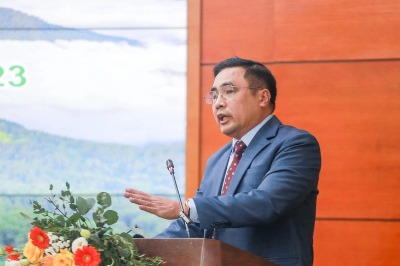
Deputy Minister of Agriculture and Rural Development (MARD) Nguyen Quoc Tri unveiled the figures at a conference held on Wednesday to review the forestry sector’s operations in 2023 and discuss its business plan for 2024.
2023 marked a significant milestone for Vietnam, which successfully sold a total of 10.3 million forest carbon credits, equivalent to 10.3 million tons of CO2, generated in the north-central region through the World Bank (WB) for $5 per ton, Deputy Minister Tri said.
He attributed the sale, the first of its kind, to an agreement signed between the MARD and the WB in February 2020 to reduce greenhouse gas emissions in Vietnam’s north-central region during the 2018-24 period.
The Vietnam Forest Protection and Development Fund, under the MARD, has received the first payment of $41.2 million from the WB for the $51.5-million sale and has disbursed the proceeds to relevant agencies in all six provinces of the region in proportion to their carbon credit volumes, Tri stated.
Accordingly, Nghe An earned more than VND282 billion ($11.6 million) from the sale, while Quang Binh made VND235 billion ($9.7 million), Thanh Hoa VND162 billion ($6.7 million), Ha Tinh VND122 ($5 million), Thua Thien-Hue VND107 billion ($4.4 million), and Quang Tri VND51 billion ($2.1 million).
Authorities in each of the six localities will distribute revenues from the sale to forest owners, considering their contributions to the locality’s carbon credit quantities, the deputy minister said.
This region possesses over 3.1 million hectares of forest land, constituting 57.4 percent of its natural land and representing 21.2 percent of the country’s total forested area, according to the Vietnam Administration of Forestry (VAF) under the MARD.
The WB highly appreciated Vietnam’s first-ever sale of forest carbon credits and wants to “share and spread this story of Vietnam to other countries around the world,” said Pham Hong Luong, chief of office of the VAF.
Vietnam boasts 14.7 million hectares of forest covering over 42 percent of the country, Luong added.
Carbon credits are tradable certificates that give holders the right to emit a certain amount of CO2 or another amount of greenhouse gas converted to CO2 equivalents.
One carbon credit is equal to one ton of CO2 or one ton of CO2 equivalents.
Dr. Tang The Cuong, director of the Ministry of Natural Resources and Environment’s Department of Climate Change, mentioned in a recent interview with Tuoi Tre (Youth) newspaper that a carbon credit market is set to undergo a pilot phase in Vietnam in 2025 before official operations commence in 2028.
This initiative aims to contribute to the reduction of greenhouse gas emissions, aligning with the goal of achieving net-zero emissions by 2050.
It is anticipated to enhance income for businesses and individuals involved in forest protection and development.
Currently, 58 countries are developing carbon markets, 27 others are collecting carbon taxes, and several more are applying both.
Vinh Tho – Chi Tue




